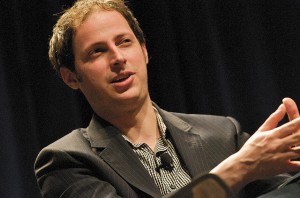“This is in many ways how major media has domesticated blogging.”
Yesterday the buzz in newsland was all about Nate Silver’s decision to move his FiveThirtyEight.com franchise from the New York Times to ESPN. (Good round-up here.) A subplot was provided by public editor Margaret Sullivan.  She described Silver as an awkward fit for the Times newsroom and an object of resentment among some political reporters.
She described Silver as an awkward fit for the Times newsroom and an object of resentment among some political reporters.
This led to something I had never seen before. Damien Cave, a Times correspondent in Mexico City, appealed on Twitter to his unknown Times colleagues on the political beat who had resented Silver. Cave wanted them to come out publicly and explain themselves. “It’s a debate worth having,” he said. (Didn’t happen.) After Jack Shafer of Reuters wrote that Silver “may be the only Times employee who gave the paper more than the paper ever gave to him,” Binyamin Appelbaum, a reporter in the Times Washington bureau, sent this acid reply.
Are there people other than @jackshafer who think Nate Silver gave more to the Times than, say, Anthony Shadid? http://t.co/x54ft2Nd0m
— Binyamin Appelbaum (@BCAppelbaum) July 23, 2013
Shadid, one of the greatest foreign correspondents in Times history, gave his life while covering the civil war in Syria.
Let’s step back from the sniping to look at the rise of the personal franchise site, which Silver said was a big factor in his decision. The category includes:
* Dealbook, built around Andrew Ross Sorkin, New York Times. It covers Wall Street dealmaking.
* Wonkblog, built around Ezra Klein, Washington Post. Politics and public policy.
* Fivethirtyeight.com, to be built around Nate Silver, ESPN. Data-driven coverage of sports, politics, business, weather, culture.
* Grantland, built around Bill Simmons, ESPN. Writerly coverage of sports and popular culture.
* MMQB, which launched yesterday around Peter King, Sports Illustrated. NFL football.
* AllThingsD, built around Walter Mossberg and Kara Swisher, Dow Jones. Technology news.
Key features of the personal franchise site:
* Star journalist at the center with a large online following and cross-platform presence. (Six of the seven I named are male.)
* Editorial control rests largely or entirely with the founder and personality at the center.
* Part of a larger media company with a negotiated balance of power between the two states. (See Shafer on this.)
* Identifiable niche or niches; no attempt to be comprehensive. (It’s all Things Digital, not all things business.)
* Plenty of voice, attitude and personal expression allowed.
* Mix of news, opinion, analysis without a lot of fuss about categorizing each.
* Additional journalists are hired as the franchise succeeds and the founder gets to hire them.
Why are we seeing the growth of this state-within-a-state model?
1. Multiple shifts in power in the media business, which I described here, have converged around this model. One sign of that power shift: Many argued for it, but only Andrew Sorkin was able to insist that Dealbook stand outside the Times pay meter system and remain free.
2. As Josh Marshall of Talking Points Memo (an independent personal franchise site) said: “This is in many ways how major media has domesticated blogging.” In other words: “It takes some of the voice, idiosyncrasy and focus of blogging and scales it with the resources and audience numbers independents really cannot muster.”
3. Brands still mean something as a guarantor of quality and huge audiences attach to them, but they are weak on voice, which creates loyalty. Loyalty moves across platforms as platforms shift. The state-within-a-state model solves for that, as Marshall suggested.
4. Digital metrics allow media companies to measure the worth of the individual journalist in a way that was not possible before. That makes it possible to rationalize the investment in a personal franchise site. And of course the star journalist can look at those numbers too and use them as leverage.
5. As Marshall, Andrew Sullivan, Om Malik and others have shown, it’s possible to do the same thing as an independent, but fewer journalists have the determination and ingenuity to run their own business. Also: Big Media has the lawyers and that’s got to be a huge relief.
6. I think news executives are somewhat intimidated by the enormity of the culture shift required within legacy organizations. Instead of trying to renovate the ideology of professional newswork, a huge task that invites grandstanding, it’s easier for the editors of the Washington Post to let Ezra Klein do his (already shifted) thing and then add people to that franchise. They avoid a holy war over news vs. opinion while quietly letting the distinction corrode. Note that Klein is one of the Post’s most important political journalists but within the newsroom he is officially classified as a opinion columnist for the business section. This is a recognition that the formal structure makes no sense. The personal franchise site allows for innovation without toppling certain fictions that editors and some reporters hold dear. 
Photo of Nate Silver by JD Lasica (Creative Commons.)